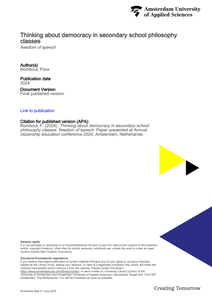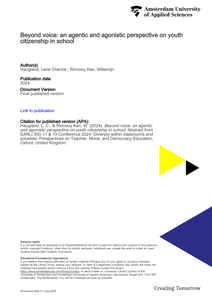The views young people have towards democratic values shape their views in later life. However, the values that are fundamental to democracy, such as majority rule and minority rights, are often competing. This study aims to provide insight into the ways adolescents view democratic issues in which democratic values are competing. To do so, three democratic issues with varying conditions were designed, and discussed during interviews with students in vocational education. The results show that most adolescents consider both democratic values that underlie an issue. Furthermore, as the conditions in which the issues take place were altered during the interviews, adolescents explicitly evaluated different perspectives and starting shifting between both values. The findings of this study show that adolescents’ views on democratic issues are layered, and include considering multiple democratic values and taking account of the conditions in which these are situated.
MULTIFILE

Highlights−Constitutional freedom of education affects democratic citizenship education policy.−Citizenship education legislation in 2006 and 2007 placed little demands on schools.−Legislation introduced in 2021 has further specified what is expected from schools.−Studies of citizenship education in practice are largely critical of the extentto which schools teach about, through and for democracy.Purpose:This paper discusses developments in citizenship education policy and practice in the Netherlands, and outlines key challenges as faced by the different stakeholders involved.Design/methodology/approach:Our discussion is based on existing research and policy documents in the Netherlands. The authors, from three Dutch universities, are experts in the field of research on citizenship education.Findings:Promoting citizenship education in primary, secondary and vocational tertiary education in the Netherlands has been challenging, particularly in light of the constitutional freedom of education in the Netherlands. Five issues are discussed in this regard: the contents of CE legislation, the normative character of legal requirements, integration of CE legislation in national curriculum aims, clarifying expectations from schools in teaching CE, and teacher education and professionalization.
DOCUMENT

Effective teaching for democracy requires an understanding of the teaching methods and educational characteristics that are effective in interventions. In order to address this requirement, we conducted a systematic literature review. We used an extensive search syntax and snowballing method that allowed us to find n = 2093 unique publications. After a screening process, we have included 54 interventions in 51 different quantitative effect studies written between 2010 and 2020. We categorized these interventions into five types of teaching methods: instruction, small-group work, assignments, projects, and democratic decision-making. We analyzed what the educational characteristics (i.e., subject matter, classroom interaction, classroom management) of these interventions were and for which democratic competences (i.e., knowledge, attitude, skill, behavior) they were effective. Our results show that teaching methods have differential effects on democratic competences. We also discuss the robustness of these results. Our study shows that there is still much to be gained in terms of research designs, the conceptualization of democratic competences, and the description of teaching methods.
MULTIFILE

Secondary schools are well placed to avert radicalization processes toward extremism because such trajectories often begin in adolescence. Adolescents are in the process of forming their identities, and most adolescents are idealistic, which makes them susceptible to groups that passionately pursue utopian visions. To avert the path toward extremism, Doret de Ruyter and Stijn Sieckelinck propose to balance a prevention approach with a positive educative ethos that is sensitive to the emotions involved in students' quest for meaning in life and identity formation. This involves schools being places where all students experience that they matter and where they can express their passion for their ideals and experiment with their identities without being ridiculed; at the same time, schools must guide students in learning that not everything they value will be accepted and that they must also take into account the interests and rights of others. The schools' role is thus complex and precarious, and teachers are in a position of navigating a politically sensitive minefield daily. Therefore, any theoretical proposition regarding what schools can realistically do to prevent extremism must be informed by everyday educational practice.
DOCUMENT

Keywords: citizenship education, democratic education, teacher training,national curricula, social sciences- Citizenship education is in teacher training in the Netherlands linked to boththe pedagogical and didactic tasks of teachers.- The task of teachers to stimulate the development of values in students isaddressed a lot less often.- The idea of democracy and rule of law as a framework for citizenship is notmentioned in most knowledge bases.- As a result, some knowledge bases seem to lack direction, as if all opinionsand all ways of ‘dealing with diversity’ are desirable.Purpose: With this article we aim to provide insight into how citizenshipeducation receives attention in the formulated national curricula for teachereducation in the Netherlands and to what extent the different domains ofcitizenship and the different tasks of teachers with regard to citizenshipeducation are addressed.Method: For this study the knowledge base for all teacher training curricula atBachelor and Master level in the Netherlands were analysed. We looked at theextent to which citizenship (education) is addressed in teacher training and theways in which this takes place.Findings: The results of the study show that several domains of citizenship arementioned, albeit not often together in one knowledge base. Citizenshipeducation is linked to both the pedagogical and didactic tasks of teachers. Thetask of teachers to stimulate the development of values in students is addresseda lot less often. The fact that citizenship also involves moral development is onlymentioned in some knowledge base. Also, the idea of democracy and rule of lawas a framework for citizenship is not mentioned in most knowledge bases. As aresult, some knowledge bases seems to lack direction, as if all opinions and allways of ‘dealing with diversity’ are desirable.
DOCUMENT

This dissertation aims to strengthen socioscientific issues (SSI) education by focusing on the resources available to students. SSI education is a type of science and citizenship education that supports students’ informed and critical engagement with social issues that have scientific or technological dimensions. This dissertation explores students’ SSI-related resources relevant to their engagement with SSI, such as their attitudes and social resources. The dissertation consists of four papers. The first is a position paper that introduces the concept of socioscientific capital and argues why it is important to pay attention to students’ resources in SSI-based teaching. The other three papers involve empirical, quantitative studies. Two questionnaires were developed that were used to investigate student differences regarding engagement with SSI: the Pupils’ Attitudes towards Socioscientific Issues (PASSI) questionnaire and the Use of Sources of Knowledge (USK) questionnaire. The final study is an exploration of the effects of SSI-based teaching on students’ attitudes toward SSI, considering socioscientific capital.
MULTIFILE
Philosophy is an elective subject in secondary education in the Netherlands, which is not often studied in the context of citizenship education. This is probably because only a minority of students participate in philosophy classes in the upper grades of secondary education (approximately 2-5% of all students). However, especially in the years 2022-2025 philosophy is particularly interesting for those studying how citizenship education can be taught, because the higher general track students study a range of philosophical ideas about democracy for their final exams (Spoelstra et al., 2021).This paper presents a qualitative analysis of three philosophy classes about freedom of speech. The lesson transcripts, pre- and post-observation interviews with 3 teachers and 15 students (5 from each class) are coded thematically with a framework for four teacher responsibilities during philosophical discussion in moral education. These four responsibilities are: teachers have an organizational responsibility to facilitate lesson activities such as classroom dialogue to facilitate thinking about democracy, an epistemic responsibility to warrant valid reasoning and recognition of established facts during the lesson, a pedagogic responsibility to create a safe and open classroom climate and a moral responsibility to find the right balance between value communication and stimulation (Leenders & Veugelers, 2004; Rombout et al., 2022; Sprod, 2001). The main research question was: how do philosophy teachers realize these four responsibilities to facilitate their students’ thinking about democracy in a lesson about freedom of speech and how to teacher and students evaluate these responsibilities in this lesson?The findings contain rich descriptions of lesson activities such as considering borderline cases, facilitating teacher-led dialogue, organizing debate, and learning about philosophers’ arguments. These are supplemented with reflections of the participants on teacher neutrality and how open and safe the classroom climate was during these lessons.
DOCUMENT

Studies show that adolescents that follow a higher educational track have more positive experiences than those of lower levels with aspects of democracy, such as decision-making or discussions. In our study, we focus on how adolescents from different educational tracks evaluate the various possibilities to experience democracy in daily life, and whether school is compensating for any difference therein. Data were gathered by interviewing 40 adolescents at two points in time (eighth and tenth grade). The results suggest that, especially in the later phase of secondary education, according to the experiences of adolescents it is apparent that school exacerbates instead of decreases social differences in society. Those in the higher educational track experience more often than those in the lower track having discussions and being encouraged to be socially and politically engaged. We discuss opportunities for teachers and for citizenship education to strengthen democratic socialization in both educational tracks.
DOCUMENT

During the past two decades, citizenship education has become an educational priority across Europe and in the United States, in policy, practice and research alike. Often this educational priority is understood through the lens of education’s contribution to the process of youth becoming citizens. In this theoretical study, the aim is to contribute to a growing body of studies seeking to reconceptualise youth as not just becoming citizens, but as being citizens and doing citizenship. This reconceptualization impacts the way the role of schools in light of citizenship education can, and should, be understood. We combine insights from Dewey’s work on experiential learning and democracy as ‘a mode of associated living’ and Mouffe’s agonistic model of democracy to further develop the understanding of the relation between the school context and youth citizenship. As an example of the implications of the reconceptualization of youth citizenship, we explore its relation with ‘voice’ in school. We conclude by reflecting on the implications of this conceptualisation of youth citizenship for researchers, educational practitioners and policymakers.
MULTIFILE
